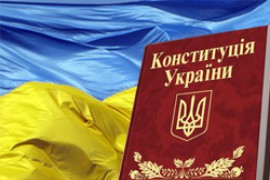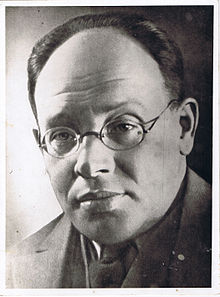As long opined in numerous entries, and at several international round tables during 2015, this blog has stated that the 300 (+) constitutional majority vote within the Verkhovna Rada to enable “decentralisation” of more power to the regions – a much needed move toward the “Europeanisation” of governance and away from the central Soviet/post Soviet governance hangover – would fail to get the required votes easily.
There are several reasons for this, despite there being no real objections to the concept of decentralisation throughout the Verkhovna Rada. The most talked about issue with the proposed constitutional amendments allowing for decentralisation, although far from being the only objection, is the single sentence that provides for a “Special Law” with regard to the occupied Donbas.
As such the Constitution if amended per the proposed amendments would provide no specific status in and of the Constitution itself, but would allow for standard statutory laws to treat the occupied Donbas separately – at least until such time as those laws were repealed (or expired should they be given a statutory shelf life within the text of any such legislation).
Whilst the other issues that do not sit well with certain parties will cost votes, it is the “Special Law” provision that costs too many votes and sees the Constitutional 300 (+) majority fall short.
President Poroshenko publicly claims to have the 300 (+) votes – which seems somewhat implausible. If they were there now, the proposed amendments would be tabled for Verkhovna Rada vote this week in order to honour the President’s previously orated commitments to have them passed by the end of January – As stated a few weeks ago (once again), this seemed highly unlikely.
There is also the Constitutional issue of Article 158, which places specific parameters and time frames upon constitutional amendment procedures. This has caused hasty submissions to the courts to define interpretations of certain phrases that would effect how those time lines are understood. In short, efforts are afoot in stretching the time lines as far as possible within the elasticity of the wording with a “helpful” judicial interpretation.
Suffice to say any such “helpful” judicial interpretation will only help so far. It will at best buy a couple of months. It is perhaps the presidential hope that the current circumstances within the occupied Donbas will have improved enough to change a few “nays” into a few “yeahs”. “Hope” however, is not a strategy. A rough count would have the constitutional amendments at best having the support of about 280 MPs, thus a few “nays” turned “yeahs” will still be short of the minimum 300 required. Indeed the “nays” are gathering momentum within the Verkhovna Rada rather than the “yeahs” – despite almost all MPs accepting the nation both needs and wants decentralisation.
Naturally to simply remove the single sentence in the constitutional amendments that mention the Donbas would probably see the amendments garner sufficient support in short order. The occupied Donbas, like the rest of the Donbas and every other region, being constitutionally treated the same and without any special mention.
Of course The Kremlin would immediately take umbridge, and its proxies possibly immediately up the anti. The Kremlin would loudly lament Ukraine failing in its Minsk II obligations (despite doing nothing itself) and demand sanctions be lifted, or at least relaxed. Certain weak European capitals may finally give way.
The question is therefore, are enough Ukrainian MPs prepared to see sanctions on Russia lifted at the expense of keeping the “Special Law” reference out of the constitutional amendments? The answer may well be yes – and that, whether scaremongering or genuinely believed, is probably why President Poroshenko made a stark statement that a far greater war with Russia may occur without the amendments being adopted “as is”. The President’s inferred argument being, not only will European sanctions probably be lifted, but there is a greater chance of more Ukrainian blood, treasure and territory being lost too.
Further, the delays in decentralisation for the rest of the nation will be accepted for only so long by a constituency that for the past 18 months has been conditioned to expect it.
Ultimately an already dysfunctional coalition could collapse, early Verkhovna Rada elections be called, and witness The Kremlin attempt to force a “parallel election” within the occupied Donbas at the same time as those for a new Verkhovna Rada. Lest we forget, at some point, The Kremlin may push for MPs within the Verkhovna Rada from the occupied territories. As they remain part of Ukraine, the argument will go, why do they have no MPs in the national legislature? (As and when there is advantage for The Kremlin to do so.)
There is now the submission of a draft Bill (3781) that seeks to change the constitutional process, involving referendums and thus the inclusiveness of society, rather than simply allowing the political class becoming deadlocked in systemic crisis – like now. This however will not be swift, and although far more democratic and thus difficult for the Europeans to argue against even if it slows decentralisation, it may have little bearing over the lifting of sanctions when Ukraine fails to fulfill its onerous Minsk II obligations – nor over any upping of the anti from those in the occupied Donbas unlikely to be on the better end of any referendum throughout Ukraine.
There is then the matter of how any referendum is put to the people. The options must be clear and unambiguous to insure a clear and unambiguous answer. The ramifications of any answer must also be clearly understood by the constituency answering it. There will need to be sufficient turnout across enough regions to make a referendum outcome legitimate and/or binding.
Whatever the case, there is now an impasse within the Verkhovna Rada with regard to the constitutional amendments facilitating national and much needed decentralisation – as well as the aforementioned occupied Donbas issue. Whilst the desperate attempt to kick the constitutional time frame down the road a little will probably prove successful, it will not provide a solution to the problems now faced, nor provide much additional time to find one. It is going to take much more than a genuine ceasefire and prisoner swaps to turn sufficient “nays” into “yeahs” within the Verkhovna Rada for President Poroshenko – and currently there is not even a ceasefire worthy of the name.
Quite how this will be resolved – if it gets resolved – is unclear. Despite any presidential proclamations that the required 300 Verkhovna Rada votes are already there, it is perhaps far more accurate to state an awful lot of political and diplomatic energy is going to have to be spent navigating a path to see these proposed amendments actually amend the constitution before constitutional procedural time frames prevent it.
* * * * * *
Post Script: Regular readers be aware that your author will now be traveling on and off for the best part of a month, and thus daily entries and musings may become a little more sporadic.
However, there will be “Guest Posts” that will go some way to fill the (hopefully only occasional) void.
Therefore if the style and content suddenly seem at a variance to the norm, (and/or the quality far higher), do check the name of the author for that particular entry.










